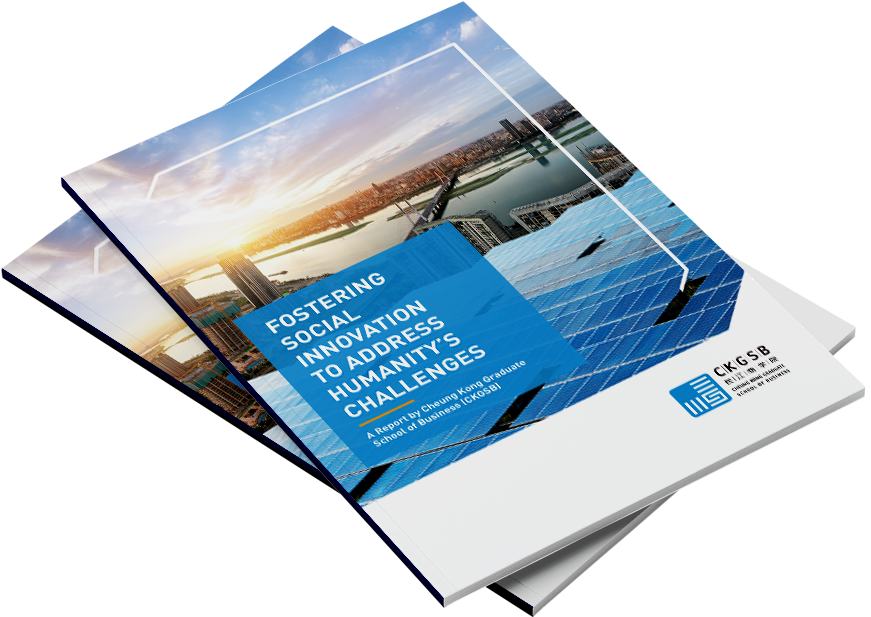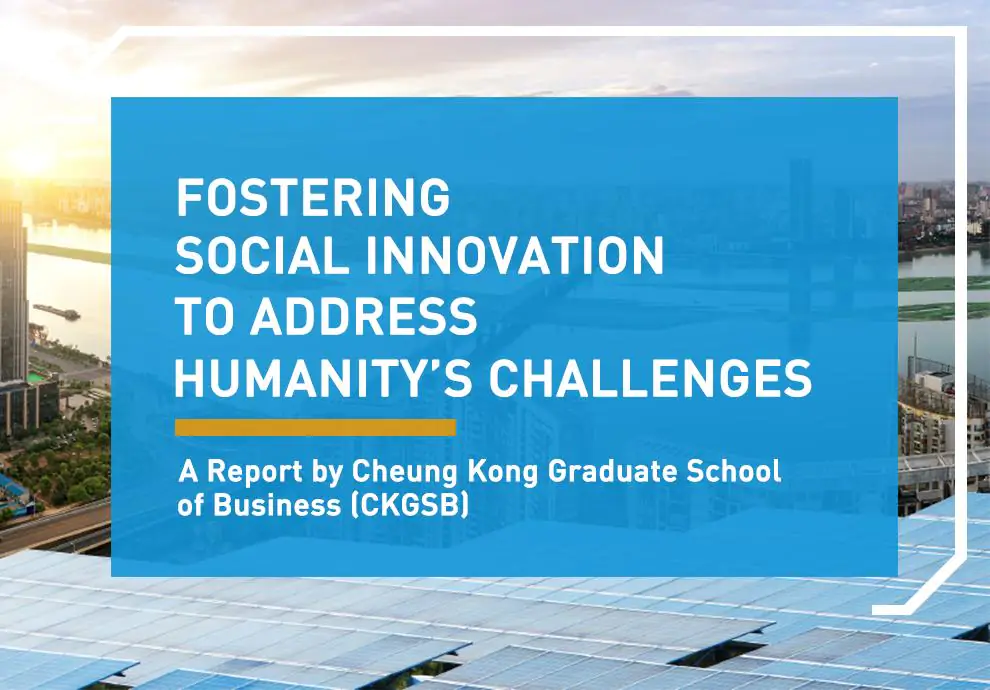
Fostering Social Innovation to Address Humanity’s Challenges
Working with partners across the international business sector, global think tanks, multilateral organizations and academia, China’s leading business school, Cheung Kong Graduate School of Business (CKGSB) publishes a report on “Fostering Social Innovation to Address Humanity’s Challenges.”
Working with partners across the international business sector, global think tanks, multilateral organizations and academia, China’s leading business school, Cheung Kong Graduate School of Business (CKGSB) publishes a report on “Fostering Social Innovation to Address Humanity’s Challenges.” Social innovation, as CKGSB defines it, is the collaboration among businesses, governments, multilateral institutions, non-profit organizations and civil society to develop and deploy effective and innovative solutions to humanity’s most challenging issues.

Drawing on the multitude of perspectives and best practices, the report offers practitioners and organizations a holistic understanding of how social innovation can be applied across sectors, why it matters and what global thought leaders are doing to enact change, which could offer potential solutions to some of the world’s gravest socioeconomic and environmental issues.
“What makes social innovation so powerful to help us achieve the SDGs is that it allows us to address the inter-linkages that exist across the goals,” wrote Siddharth Chatterjee, Resident Coordinator in China of United Nations, in the report. CKGSB Founding Dean Xiang Bing wrote, “Particularly in light of climate change and the ramifications of the COVID-19 pandemic, it has become more urgent and imperative for business schools to play a catalyst role in advancing cooperation among the different stakeholders.”
As a publication advocating for social innovation, the report includes 23 articles from contributors across a range of organizations, including the United Nations, the World Bank, ExxonMobil, PWC, Arup, Accenture, United Way Worldwide, Caixin Global, The Economist, Unilever, the University of Cambridge and CKGSB. The first section of the report features professors from CKGSB and partner schools as they provide research and analyses with frameworks for implementation. The second section showcases viewpoints of various international institutions that have been devoting themselves to solving issues that go beyond national boundaries by working with educational institutions, such as CKGSB, to create greater synergy. The third section showcases businesses, one of the major building blocks to combating societal issues and one that CKGSB believes can be shaped by transformative business leaders with a global vision, sense of social responsibility, innovative mindset, and ability to lead with empathy and compassion. Finally, the report ends with two case studies led by CKGSB utilizing socially innovative ways to improve access to basic services in remote communities and alleviating poverty in some of China’s most deprived areas.
Report Highlights
Introduction
1. Message from the Dean, Xiang Bing, Founding Dean and Professor of China Business and Globalization, CKGSB
2. Achieving the SDGs in a Post-pandemic World: The Role of Social Innovation, Siddharth Chatterjee, China Resident Coordinator, United Nations
Academia
3. In-depth Analysis: Seeking Common Prosperity from a Global Perspective, Xiang Bing, Founding Dean and Professor of China Business and Globalization, CKGSB
4. Making Social Innovation Happen: How to Lead for Impact, Richard Hill, Head of Knowledge & Learning, Møller Institute, Churchill College, University of Cambridge
5. Developing ‘Business for Good’ in China, Zhu Rui (Juliet), Professor of Marketing and Director of the Social Innovation and Business for Good Centre, CKGSB
6. Why We Have Been Understating the Costs of Air Pollution, Brian Viard, Professor of Economics, CKGSB
7. Chasing Carbon Neutrality, Liu Jing, Professor of Accounting and Finance, CKGSB, and Duan Lei, Senior Researcher, Business Scholars Program, CKGSB
8. Changing Consumption and Production Behaviors, Sun Baohong, Dean’s Distinguished Chair Professor of Marketing, CKGSB
9. Why Social Innovation Matters, Ji Bo, Chief Representative of CKGSB Europe and Assistant Dean, CKGSB
International Organizations
10. From Poverty Reduction to Common Prosperity: Challenging Reforms, Big Upside, Martin Raiser, Country Director for China, World Bank
11. Philanthropy in China, Yuan Jiakai, Vice President and China Chief Representative, United Way China
12. Social Innovation is Key to Safe E-Waste Disposal, Frank-Jürgen Richter, Chairman, Horasis
13. Reducing Our Global Footprint, Nathalie Bastianelli, Founder, WeBelongtoChange Foundation
14. A Step towards Mutual Prosperity: Putting Purpose into Practice: The Economics of Mutuality, Bruno Roche, Founder, Economics of Mutuality
Businesses
15. The Future of Green Finance and Impact Investment, Gao Erji, Vice President, Caixin Media
16. Bridging the Environmental Sustainability Gap, Alfredo Montufar-Helu, Beijing Director for The Economist Corporate Network, The Economist Group
17. Radical innovation – Only Half the Story, Mauricio Bermudez Neubauer, Managing Director of Net Zero Industry Transitions, Accenture
18. Infrastructure and Climate Change: The Role of Sustainable Infrastructure in the Transition to Low Carbon Economies, Gregory Hodkinson, Senior Advisor and former Chairman, Arup Group
19. Leading in a Lower Carbon Future, Fernando Vallina, Chairman, ExxonMobil (China) Investment Co.
20. Creating A Sustainable World One Product at a Time, Jun Shen, Senior Engineer, Unilever Homecare North Asia R&D and Global Innovation Hub Director, Unilever China
21. How a Technology Platform Can Contribute to Net-Zero, Zhao Xiaobin, Founder and CEO, Cambond
22. What I Learnt from the Pandemic about Education, Lina Getachew Ayenew, Founder, Education for Ethiopia
23. Making Social Responsibility a Competitive Advantage for Multinationals in China, Callum Douglas, Corporate Responsibility Director, PwC
Case Studies
Case Study: CKGSB’s Ji’an Poverty Alleviation Initiative
To enhance public welfare and give back to society, CKGSB initiated a three-project campaign in 2017 to alleviate poverty in Ji’an, an impoverished district in Jiangxi, China. CKGSB used its core business – education and business management – in creative, socially innovative ways to improve access to basic services of the community, reduce the impact of disasters and raise the living standard in Ji’an.
Case Study: CKGSB’s Goji Berry Project
During a trip to the Gobi Desert Challenge in 2015, a group of CKGSB professors, alumni, students and staff voluntarily helped the local villagers sell their unique local Goji berries using innovative business strategies to design, market, distribute and sell their product, raising the annual income of all in the community by nearly 35% and helping lift them out of poverty in a dignified way.














